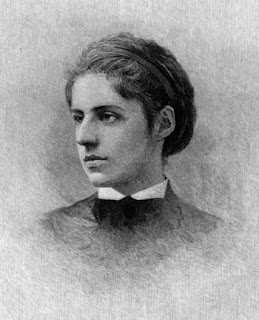 Rich Hoggan
Rich HogganSui Sin Far Posting
01-27-11
Sui Sin Far, was a writer who used realism to demonstrate the strife faced by many Chinese as they immigrated to the United States. Taken from her introduction "'Mrs. Spring Fragrance' was first published in Hampton's Magazine in January 1910. In 1912 it became the title story for the only book Sui Sin Far published. The thirty-seven stories, articles, and sketches brought together in this volume provide a clear sense of Sui Sin Far's commitment to expose the racial, political, social, and economic abuses ordinary Chinese immigrants experienced in late-ninetheenth-century America" (879). While reading her story this week, it was hard to put a finger on the prejudice and racism occurring during the story. It was possible that the white lawyer was bribing them instead of just doing his job but it's also possible that the government as a whole was making it harder for the Chinese.
It's quite clear that for the longest time, these kinds of actions have taken place in the land of the free as Far points out in her short story. The way she wrote, is similar to how other authors wrote about such issues including Washington, Du Bois, Winnemucca, and Sa. In each of their stories we see a vivid interpretation of the abuses taken place all around them. Taken from her profile page on enotes.com, the authors write "Far's subtly ironic narrative perspective has led critic Annette White-Parks to identify her as a 'trickster' figure, who shrewdly adopts a 'double voice' in her narratives in order to challenge accepted notions of race and gender. The realism of Far's fiction has been praised for its vivid, detailed descriptions of everyday life in the turn-of-the-century Chinatowns of urban United States and Canada" (enotes.com - Sui Sin Far).
Taking all this into account, the real culprit in her short story is not the white people but time itself. For it was time that caused Lae Choo to wait for her child to come home, time when dealing with the government, and time when waiting on the lawyer to finish the job and get their her son back. It's hard to say if this was an abuse by the United States government or the law of the land when it comes to understanding why the child can't enter. Or is there more to the story? Is it possible Far is hinting on the idea of immigration rights? Even so, the rules and regulations put into place are there for a reason. America is a nation that speaks to the minds and hearts of all oppressed people around the world as being a refuge. It's the place where everyone wishes to come to start their pursuit of the "American dream." But while America is like no other country not he world stage -- unique in its own right -- it's a country none the less. We can't forego rules and regulations for the sake of wanting to live here.
As we bring Far's legacy of writing into current times, there is no denying that something needs to be done with regard to immigration rights. It's necessary that we take into considering the writings of Far and other authors as they speak to the wrongdoings of our past. It's also necessary that we as a nation protect those who come here through legal means as they attempt to begin their "American dream." To take one last look at Far's work, if that means having to amend the documentation of Hom Hing and Lae Choo than that's the protection required of a couple who came to America to live a better life.



